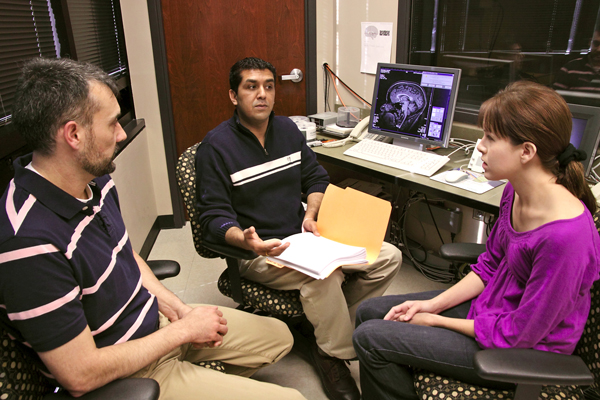Overview
The Behavioral Neuroscience PhD program is designed to be completed in five years (12 months/year) of full-time studies. We only admit students who can commit to full-time studies throughout the duration of the program.

Core Curriculum
All students take a first-year core curriculum that includes foundations of behavioral neuroscience, statistics, and psychology electives. These courses build on undergraduate training and provide initial advanced training in behavioral neuroscience. Students also complete research rotations.
In the second year, students select an additional four courses that are germane to their own research interests in conjunction with advice from their faculty mentor. A weekly behavioral neuroscience graduate seminar, taught by the program director, is taken every semester in residence. Students participate in professional development activities, develop formal presentations, and discuss published literature. The seminar develops students’ ability to evaluate and present research, address an audience, answer challenging questions, and critically discuss issues with their peers. UAB faculty from other departments speak during seminar to facilitate choice of first-year research mentors and potential PhD mentors.
Students also engage in active seminar programs at UAB. This gives students a solid foundation in the history, methods, theory, and current research in behavioral neuroscience. As the program is interdisciplinary in nature, additional coursework is often completed in other departments (e.g., Neurobiology and Vision Sciences). Students must fulfill a second-year research requirement and pass a qualifying examination. Once these requirements are satisfied students advance to candidacy for dissertation research. The PhD is awarded upon successful defense of the dissertation.
Research Rotations
Our first-year students complete two to three research rotations in their first year with potential PhD mentors. These laboratory rotations teach valuable research skills and allow students to make an informed decision about their future research direction and mentorship. Students are able to explore potential areas of research interests and potential research mentors prior to making a firm commitment before their second year of study.
The ability to complete first-year laboratory rotations is one of the primary reasons students select our PhD program over others. Students can choose any research rotation mentor at the university as long as their research interests lie within the domain of Behavioral Neuroscience. During the research rotation students learn valuable research skills and often obtain authorship on a presentation or research paper that derives from their work.
Choosing a Faculty Mentor
A critical feature of our program is that each student has a faculty mentor who is responsible for both funding and guiding them through the PhD program and teaching them how to function as a behavioral neuroscientist. The faculty mentor-doctoral student relationship is formed by mutual consent before the second year of training. Our full-time students are actively engaged in research every semester, including summers.
It is important that students identify a faculty member whose research is of significant interest to them at the time they apply to our program. Consult the faculty profiles and our research section for more information about current research. Students will develop a systematic line of research in collaboration with one (or more) faculty mentors, and in the process complete the research requirements for the PhD.
After students choose a research PhD mentor, they will take a minimum of four courses to complete their didactic training. These courses are chosen by the student and their mentor in order to achieve greater training flexibility. Most students also continue to take additional courses and attend seminars and journal clubs within the department of their mentor.
Teaching
We encourage our students to teach undergraduate courses in the Department of Psychology. Typically, students teach research labs in statistics prior to teaching more comprehensive courses.
Student Support
Graduate students in the Behavioral Neuroscience PhD program are supported by university fellowships or teaching assistantships in their first year of training. Thereafter, students are supported by their mentor’s research grants, training grant fellowships, or teaching assistantships. Five years of funding is guaranteed for students in good standing.
Travel
Students may apply for travel funds available through the Psychology Department and the Graduate School to present findings at scientific meetings. Learn more on the Psychology Financial Support page and the Graduate School website.